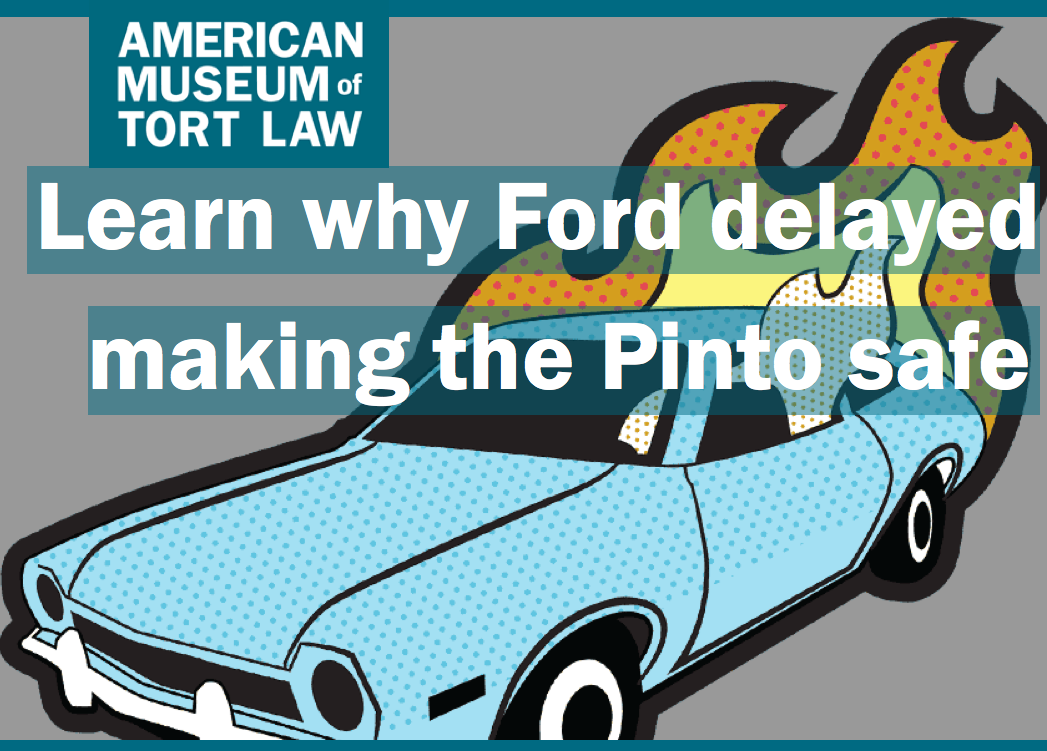Ralph Nader and ‘The American Museum of Tort Law’

A tort, is a civil wrong or wrongful act, whether intentional or accidental, from which injury occurs to another. The law of civil wrongs, whether caused by assault, battery, negligent (careless) conduct, medical malpractice, dangerous consumer products, libel or slander is all gathered under the large legal umbrella known as tort law. Generally speaking, if one has been injured by the tortious conduct of another, the injured party is entitled to be compensated for the loss or damages.
For many top executives in Corporate America, however both Ralph Nader and basic tort law are villains. Why? Because for Corporate America, the first priority is profits, not safety. What these critics fail to recognize or acknowledge is that personal injury lawsuits and especially large class-action cases, along with the negative publicity they generate, put pressure on big business to enact sorely needed safety measures and improvement. Frequently, litigation, along with the financial toll it can extract, is the only effective mechanism that will persuade big business including manufacturers, real estate empires, the medical establishment and insurance companies, to effect positive changes to safeguard the welfare of the everyday consumer. It is no surprise therefore, that for the past several years, big business, under the pretext of saving jobs and reducing medical malpractice insurance premiums, has placed our civil system of justice squarely within its cross-hairs and has made Tort “Reform” a legislative priority. Effective lobbying by Corporate America, along with the insurance and medical industries, have resulted in numerous anti-consumer measures in many states, including monetary limits on compensation, mandatory arbitration and the loss of trial by jury. But here I want to accentuate the positive, so I will leave Tort “Reform” (or “deform” as we call it), to a future, separate blog.
It is beyond dispute that lawsuits, judgments and public exposure can be directly linked to the dramatic reduction in car accident deaths in the last five decades. Warnings on cigarette boxes and the reduction in horrific 3rd degree burns from scalding cups of coffee, can also be attributed to the pressure applied by civil tort cases. Consumer advocate Ralph Nader has dedicated his life to putting corporations on trial for unsafe practices and to forcing changes in business practices that makes us all safer—safer cars, safer work and play environments, safer gadgets and appliances.
Despite all the improvements, the fight for product safety remains ongoing. GM, in a scandal involving the illegal concealment of deadly defects in ignition switches, was forced to pay $900 million to the government and $575 million to settle the majority of the civil lawsuits filed by the families of the 124 confirmed killed and the thousands injured. Volkswagen was just caught scamming auto-emissions tests by programming car software to switch to a low-emissions mode only when it detects a test underway. Recently the New York Times ran a three-part series highlighting the havoc that mandatory arbitration clauses, contained in the fine print on many software licenses and service contracts, has been wreaking on our rights. These clauses, with the blessing of the current Supreme Court of the United States, force consumers to submit disputes to privately-retained arbitrators and to forgo having their day in court. Apple and Google have both invoked arbitration clauses to fight lawsuits. If software runs your ‘smart’ car, and causes it to crash, will you be able to file a claim or class-action case in public court? Probably not. Medical providers are also beginning to insist that patients sign such clauses prior to treatment. As a result of legislative inaction, Americans are unwittingly signing away our legal rights to bring claims before a jury in a court of law, as is guaranteed by the Seventh Amendment to the US Constitution.
For me, as both a private citizen and an attorney endeavoring to obtain just compensation for personal injury and medical malpractice victims, RALPH NADER is a HERO. To this day, he continues to work tirelessly to protect the rights of the individual and to uphold our constitutional rights to trial by jury in a court of law. You can now be the judge Mr. Nader and his life’s work by visiting the recently opened American Museum of Tort Law (Winsted, CT), which was developed by Mr. Nader. The museum, in a fun and user-friendly way, reveals the truth about the importance of tort law, emphasizing cases where the civil justice system led not only to compensation for injured parties, but also to changes in corporate practices that made everyone safer. https://www.tortmuseum.org



